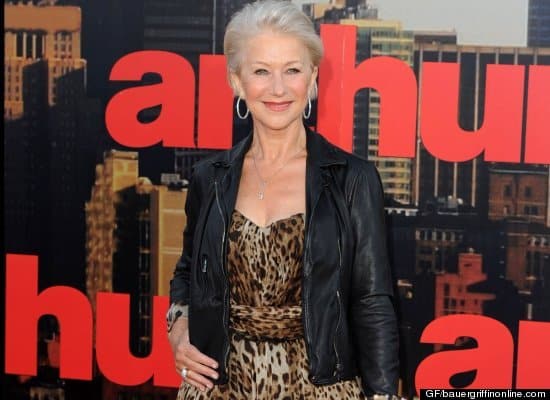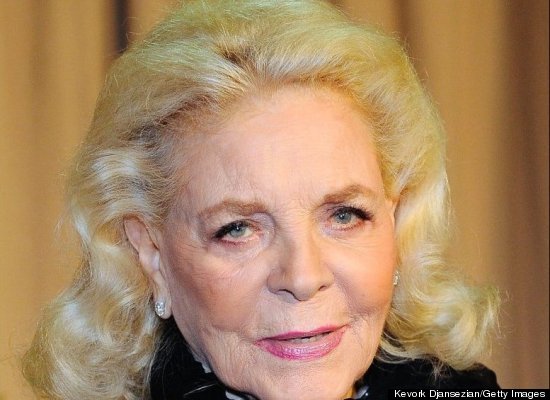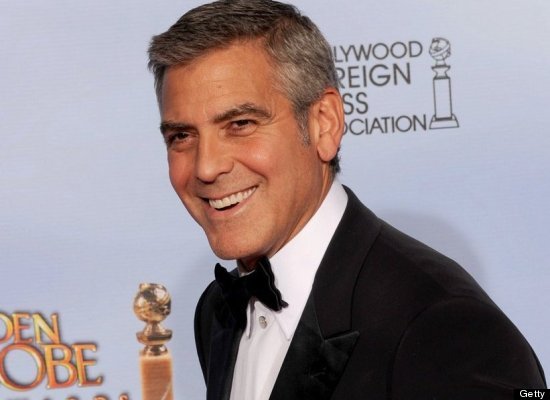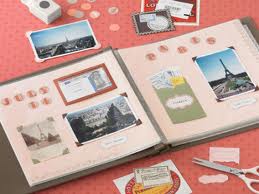>>> have heard it before. 60 is the new 50, 50 is the new 40. here’s an idea. what if finally, 60 is the new 60? amy robach is here to explain. good morning.
>> good morning. we live in a society that put as premium on youth and beauty . it may be changing to something more realistic with women saying they only want to look like one person — themselves. beauty may be only skin deep but we have always loved showing it off. the quest for youth has almost become a national past time. but have we finally said enough is enough and are hollywood and madison avenue finally listening?
>> we have had an insane love affair with youth. youth is beautiful and wonderful. but there’s lots more. life doesn’t stop when you’re 30.
>> reporter: or when you’re in your 90s. that’s right. iris apfel is the new face of m.a.c. cosmetics, an overnight sensation , 90 years in the making.
>> do you think women in america are tired of being represented by ridiculously young women ?
>> well, i hope they are. if they’re not it’s their own fault.
>> reporter: m.a.c. chose iris as a response to customers looking for real representation .
>> for m.a.c. to use a 90-year-old woman says we are not afraid of saying a woman at any age can be really, really beautiful.
>> reporter: and they are not alone. cosmetic companies are turning to older women who are redefining beauty like 54-year-old cover girl ellen degeneres .
>> some models look so mad.
>> reporter: or diane keaton , a beauty icon at 66.
>> my skin’s pretty amazing. you know what? we’re worth it.
>> reporter: magazines are seeing the worth as well. news stands are seeing a boom in baby boomers on the cover. in january, vogue chose meryl streep , at 62, their oldest cover girl in the history of the magazine.
>> i think the media is finally beginning to get it right. but it didn’t happen overnight.
>> reporter: psychologist vivian diller says they have been reacting to the baby boomer ‘s movement through middle age .
>> we saw things changing when beauty became homogenized and women said they don’t want to look like over lly puffed up frozen faces.
>> reporter: it’s not just advertiser. hollywood is seeing a movement toward the authenticity of aging.
>> now we are seeing beauty that’s more appropriate for one’s age. they are not trying to look younger. they’re trying to look the best they can for their age.
>> reporter: even if that means embracing a wrinkle or two.
>> i think it’s pitiful that people lie about their age. what’s wrong with getting older? if you’re lucky enough to get old you should celebrate it.
>> reporter: maybe you, too, could be a beauty icon at 90.
>> m.a.c.’s iris apfel collection hit stores in january and sold out in days. hopefully iris is inspiring women all over the world to be their own beauty icon. ann?
>> valerie ramsey is 72 years old and a model and the author of “gracefully, looking and being your best at any age.” donny deutsch is the chairman of the advertising company deutsch inc. good morning.
>> good morning.
>> is there a reason to understand why madison avenue made the change? is it a trend?
>> it is. it’s a fantastic trend. there is a huge bubble, men and women , moving through the population, the boomers. they have all the money. we are the most selfish generation, men or women . the rolling stones at 70 are the hot rock band. women will say no, no, no, this is what beauty is now. it’s that huge bubble moving through. number two, we have seen through all the housewives shows that plastic surgery doesn’t look good. we have had pioneers of plastic surgery walking through. you’re beautiful. you’re gorgeous and more gorgeous because you look real.
>> thank you.
>> madison avenue is following the money.
>> following the money. you were at the beginning of this. we saw a photograph of you in amy’s piece. you do wonderful work. but you were a discovered model something like nine years ago.
>> yes, at the age of 63. so unexpected.
>> you had another life, other jobs. you were in public relations and somebody discovered you.
>> yeah.
>> in terms of what donny was saying, you say in europe there was an openness to women who were older in ad campaigns.
>> right.
>> what are you finding?
>> that’s even become more of a trend now, i think. i say it because i was just recruited by a new modeling agency in paris that’s just opened up to represent men and women 40 to 85 actually. because there’s been such a boom there. having been signed by wilhemina models here at 72, that’s representative of what’s going on in the united states as well. there is just more demand.
>> how is this going to play out, donny? what are we going to start seeing? we heard about meryl streep on the cover in her 60s. she’s young.
>> three of the last were academy award winners. sandra bullock , meryl streep , helen mirren , women who are not kids. you are defining the power of the mass spending. what a great thing.
>> as long as the money is there. let’s get real.
>> it will continue.
>> if women buy things — for example, we heard about the lipstick at m.a.c. that iris is promoting and it’s selling out. when the money goes there it will continue. if the money stops it goes back.
>> won’t stop for 10, 15 years. that’s where this populous is moving. it’s the same reason — this will sound crazy — we have viagra. this generation said, no, no, my potency is not going away.
>> how did we talk about women and now it’s about you?
>> i can’t believe i keep putting this guy on the air. that’s a valid — you understand.
>> i agree completely.
>> anything more you want to say about it?
>> we as a generation aren’t going to allow ourselves to age. i’m so happy for madison avenue . i’m saying this as a man. it is so much more beautiful. don’t do this. this is more beautiful.
>> thank you.
>> as you look at this and from your perspective what is your message to women who are suddenly feeling this relief? we know that when women are only seeing young women in campaigns it puts pressure on the young people . and on ourselves.
>> right.
>> ultimately it is corrosive. what do you think?
>> i think younger women are looking at women like us and seeing that we are real, that we are continuing to be involved, that we have something very, very dynamic to offer to the world and that the real beauty comes from, i would say, above all from confidence and from having courage to be ourselves , from the wisdom that we have acquired within ourselves over the years, from vibrancy, excitement, about being involved in life. and it’s when all of those things are on the inside and shine through on the outside, that’s what real beauty is all about.
>> you make me want to cry. thank you. we’re going to give you hand for that.
, Bacall writes: “The need to work remains — movies, theatre, TV — I don’t care really. As long as it’s good — interesting — new — I love new — it will take me out of myself and into someone else. Always a pleasure.”




